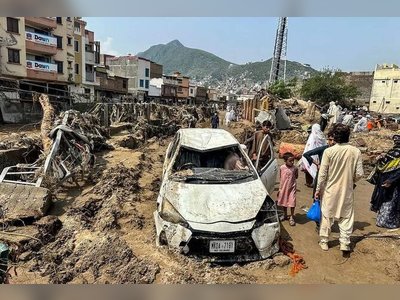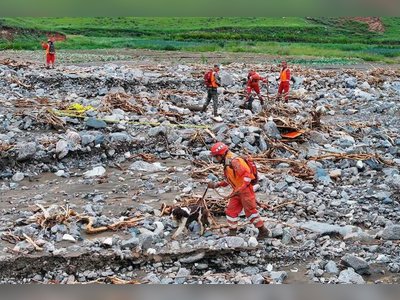
Pakistan Maintains Openness to Mountaineering Expeditions Despite Recent Climber Deaths
The government of Gilgit-Baltistan confirms no restrictions on mountaineering despite recent fatalities.
Despite the recent deaths of several climbers, Pakistan has not imposed any restrictions or warnings on mountaineering expeditions in its northern regions.
Faizullah Faraq, a spokesperson for the Gilgit-Baltistan government, stated that climbers are well aware of the risks and challenges associated with the harsh weather conditions and other dangers inherent to mountain climbing.
They continue to come to these areas in an attempt to summit some of the world's highest peaks.The latest fatality is Chinese climber Guan Jing, 37, who died last Tuesday after being struck by falling rocks on K2, the second-highest peak known for its extreme weather conditions and treacherous slopes.
Rescue efforts were successful in recovering her body, which remained at Skardu’s Combined Military Hospital mortuary as of Sunday.
Faraq indicated that contact has been made with Chinese authorities in Islamabad regarding Jing's death, with further decisions now resting with them.This incident follows the death of German mountaineer and Olympic gold medalist Laura Dahlmeier while attempting Laila Peak in the Karakoram mountain range several weeks prior.Typically, the bodies of foreign climbers who die during their attempts to summit Pakistan’s mountains are recovered at the request of their families.
However, if a family declines retrieval efforts, the remains are left at the site where the climber perished.Faraq highlighted ongoing efforts by authorities to improve infrastructure, rescue facilities, security, and create a more hospitable environment for climbers.
Mountaineering expeditions form a crucial component of the local economy, generating significant revenue.
Many people in this region rely on these expeditions for their livelihoods during the months from May to September.Annually, numerous climbers attempt to conquer Pakistan’s northern mountains, often facing accidents due to avalanches and sudden weather changes.
Last August, two Russians were stranded for six days before being rescued from a remote peak.Gilgit-Baltistan, located in Kashmir, has experienced higher-than-normal monsoon rains this year, leading to flash floods and landslides.
Faizullah Faraq, a spokesperson for the Gilgit-Baltistan government, stated that climbers are well aware of the risks and challenges associated with the harsh weather conditions and other dangers inherent to mountain climbing.
They continue to come to these areas in an attempt to summit some of the world's highest peaks.The latest fatality is Chinese climber Guan Jing, 37, who died last Tuesday after being struck by falling rocks on K2, the second-highest peak known for its extreme weather conditions and treacherous slopes.
Rescue efforts were successful in recovering her body, which remained at Skardu’s Combined Military Hospital mortuary as of Sunday.
Faraq indicated that contact has been made with Chinese authorities in Islamabad regarding Jing's death, with further decisions now resting with them.This incident follows the death of German mountaineer and Olympic gold medalist Laura Dahlmeier while attempting Laila Peak in the Karakoram mountain range several weeks prior.Typically, the bodies of foreign climbers who die during their attempts to summit Pakistan’s mountains are recovered at the request of their families.
However, if a family declines retrieval efforts, the remains are left at the site where the climber perished.Faraq highlighted ongoing efforts by authorities to improve infrastructure, rescue facilities, security, and create a more hospitable environment for climbers.
Mountaineering expeditions form a crucial component of the local economy, generating significant revenue.
Many people in this region rely on these expeditions for their livelihoods during the months from May to September.Annually, numerous climbers attempt to conquer Pakistan’s northern mountains, often facing accidents due to avalanches and sudden weather changes.
Last August, two Russians were stranded for six days before being rescued from a remote peak.Gilgit-Baltistan, located in Kashmir, has experienced higher-than-normal monsoon rains this year, leading to flash floods and landslides.










